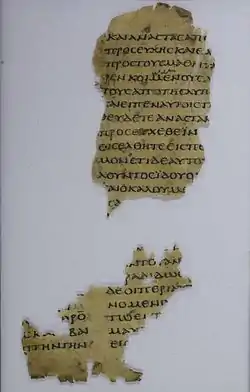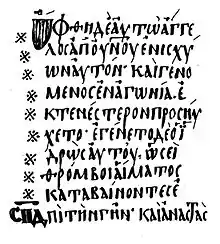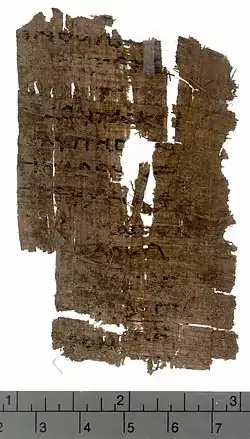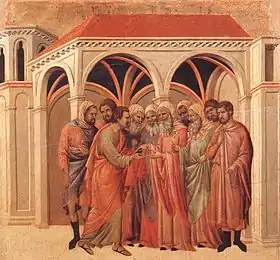Luke 22
Luke 22 is the twenty-second chapter of the Gospel of Luke in the New Testament of the Christian Bible. It commences in the days just before the Passover or Feast of Unleavened Bread, and records the plot to kill Jesus Christ, the institution of the Lord's Supper, Jesus' arrest and his trial before the Sanhedrin.[1] The book containing this chapter is anonymous, but early Christian tradition uniformly affirmed that Luke composed this Gospel as well as the Acts of the Apostles.[2] According to Eric Franklin, if the apocalyptic discourse in chapter 21 "bases all its thought upon the reality of the Kingdom", it also "leads directly into the passion narrative [which] shows how it was established".[3]
| Luke 22 | |
|---|---|
 Luke 22:44-50 on fragments a and b (recto) of the codex 0171, written about AD 300. | |
| Book | Gospel of Luke |
| Category | Gospel |
| Christian Bible part | New Testament |
| Order in the Christian part | 3 |
Text

The original text was written in Koine Greek. This chapter is divided into 71 verses. It is the second longest chapter in the gospel in terms of the number of verses.[4]
Textual witnesses
Some early manuscripts containing the text of this chapter are:
- Papyrus 75 (175-225)
- Papyrus 69 (3rd century; extant verses 41,45-48, 58-61)
- Uncial 0171 (~300; extant verses 44-50,52-56,61,63-64)
- Codex Vaticanus (325-350)
- Codex Sinaiticus (330-360)
- Codex Bezae (~400)
- Codex Washingtonianus (~400)
- Codex Alexandrinus (400-440)
- Codex Ephraemi Rescriptus (~450; extant verses 1-18)


Verses 1-6
Luke 22:1–6 describes the plot to kill Jesus, by the chief priests and scribes, in collaboration with Judas Iscariot. This is also depicted in Mark 14:1–2, 10–11 and Matthew 26:1-5, 14–16. John 11:45-57 also records the plot to kill Jesus.
Verse 3
- Then Satan entered Judas, surnamed Iscariot, who was numbered among the twelve.[5]
Luke alone of the synoptic writers sets the earthly events of the passion in the context of an eschatological battle with Satan.[3]
Verses 7-13
Luke 22:7–13 describes how Jesus sent Peter and John to prepare "a furnished upper room" (verse 12) for their taking of a Passover meal (which would be the Last Supper). This preparation is also depicted in Mark 14:12–16 and Matthew 26:17-25. Luke's is the only account which names the apostles.
The farewell address

Luke 22:14–38 has been described as "Jesus' farewell address", modeled after other farewell addresses in the Greco-Roman and biblical traditions.[6]
Verse 15
- Then He said to them, “With fervent desire I have desired to eat this Passover with you before I suffer.[7]
Jesus declares to his apostles that "with fervent desire" (Greek: επιθυμια επεθυμησα, epithumia epithumesa) he has longed to celebrate this Passover with them. Pope Gregory X used these words (Latin: Desiderio desideravi) as his text at the Second Council of Lyons in 1274, in his sermon on the unity of the churches.[8]
Verses 40-42
- Pray that you will not fall into temptation (New International Version)
- Not my will, but yours, be done (New King James Version)
The words reflect Jesus' previous instructions to his disciples on how to pray (the Lord's Prayer, Luke 11:2–4), although the words "thy will be done, on earth as it is in heaven" do not appear in the earliest-known versions of Luke's Lord's Prayer.[9] The Pulpit Commentary suggests that "the temptation in question was the grave sin of moral cowardice into which so soon the disciples fell".[10]
Verses 43-44
- Then an angel appeared to Him from heaven, strengthening Him. And being in agony, He prayed more earnestly. Then His sweat became like great drops of blood falling down to the ground.[11]
The authenticity of Luke 22:43-44 has been disputed by scholars since the second half of the 19th century. The verses are placed in double brackets in modern editions of the Greek text, and listed in a footnote in the Revised Standard Version.
Verse 45
- When He rose up from prayer, and had come to His disciples, He found them sleeping from sorrow.[12]
Luke adds "from sorrow", words which do not appear in the accounts of Matthew or Mark.
Verse 70
.jpg.webp)
- εἶπαν δὲ πάντες Σὺ οὖν εἶ ὁ Υἱὸς τοῦ Θεοῦ; ὁ δὲ πρὸς αὐτοὺς ἔφη Ὑμεῖς λέγετε ὅτι ἐγώ εἰμι.
- Eipan de pantes, "Su oun ei ho Huios tou Theou?"; ho de pros autous ephē, "Humeis legete hoti egō eimi."
- All of them asked, “Are you, then, the Son of God?”
- He said to them, “You say that I am”. (New Revised Standard Version)
The New King James Version adds "rightly":
- “You rightly say that I am".[13]
Similarly, J. B. Phillips translates as:
- “You are right; I am,” Jesus told them.[14]
The Pulpit Commentary describes the style here as rabbinic: "by such an answer, the one interrogated accepts as his own affirmation the question put to him in its entirety."[10]
See also
- Gethsemane
- Hematidrosis
- Holy Week
- Jerusalem
- Last Supper
- Ministry of Jesus
- Sanhedrin
- Other related Bible parts: Psalm 41, Matthew 26, Mark 14, John 18, 1 Corinthians 11
References
- Halley, Henry H. Halley's Bible Handbook: an Abbreviated Bible Commentary. 23rd edition. Zondervan Publishing House. 1962.
- Holman Illustrated Bible Handbook. Holman Bible Publishers, Nashville, Tennessee. 2012.
- Franklin, E., Luke in Barton, J. and Muddiman, J. (2001), The Oxford Bible Commentary, p. 954
- Chapter 1 has 80 verses
- Luke 22:3
- Kurz, W. S. (1985), Luke 22:14-38 and Greco-Roman and Biblical Farewell Addresses, Journal of Biblical Literature, Vol. 104, No. 2 (June 1985), pp. 251-268, accessed 19 July 2018
- Luke 22:15
- Catholic Encyclopedia (1913), Second Council of Lyons (1274), accessed 19 July 2018
- Pulpit Commentary on Luke 11, accessed 20 July 2018
- Pulpit Commentary on Luke 22, accessed 20 July 2018
- Luke 22:43–44
- Luke 22:45
- Luke 22:70 - NKJV
- Luke 22:70 - J.B. Phillips' New Testament
External links
| Wikimedia Commons has media related to Gospel of Luke - Chapter 22. |
- Luke 22 King James Bible - Wikisource
- English Translation with Parallel Latin Vulgate
- Online Bible at GospelHall.org (ESV, KJV, Darby, American Standard Version, Bible in Basic English)
- Multiple bible versions at Bible Gateway (NKJV, NIV, NRSV etc.)
| Preceded by Luke 21 |
Chapters of the Bible Gospel of Luke |
Succeeded by Luke 23 |